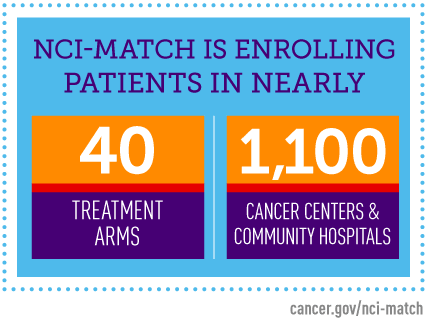NCI-MATCH Update: More Labs, New Arms, and Initial Findings
, by Lyndsay Harris, M.D.
NCI-MATCH, the largest precision medicine trial of its kind, was launched in August 2015 by NCI and the ECOG-ACRIN Cancer Research Group. Initial findings from several of the trial’s treatment arms—in effect, sub-studies of the larger trial that are testing specific therapies—have been released over the last year.
But, as is to be expected in a dynamic trial of this size and scope, much more is happening.
This includes the opening of new trial treatment arms that are testing additional drugs, and the addition of new laboratories to perform testing on tumor samples of potential trial participants.
Given the extent of the activity and the importance of this trial, we’d like to update the cancer community on the status of NCI-MATCH and share the plans for it going forward.
A New Referral Process
As a reminder, NCI-MATCH is a signal-finding trial with the goal of determining whether specific targeted therapies are safe and have activity in people with advanced cancer whose tumors have a “matching” gene mutation, regardless of their cancer type. When a strong signal is seen suggesting that a drug may shrink or stabilize tumors, it might then be further studied in a larger, more definitive clinical trial.
NCI-MATCH is enrolling patients at nearly 1,100 cancer centers and community hospitals represented across every state, the District of Columbia, and Puerto Rico, and it includes researchers from the National Clinical Trials Network and NCI Community Oncology Research Program. Pharmaceutical companies have provided the treatments being used in NCI-MATCH under an NCI Investigational New Drug application.
When the trial was first launched, doctors sent tumor tissue from new or recent patient biopsies to the NCI-MATCH Central Biorepository at the University of Texas MD Anderson Cancer Center. These tumor samples then underwent investigational genetic sequencing at one of four NCI-MATCH Network Laboratories.
In the next phase of the study, a lab referral process was developed to better capture advanced cancer patients with these rarer mutations who were having tumor testing performed as part of their routine care. Under this new approach, four additional laboratories were recruited to join the trial: two academic and two commercial labs. These labs do not specifically test samples for NCI-MATCH, but they have procedures in place to contact a patient’s physician if they find a gene abnormality that allows a patient to be eligible for the trial.
That process was very successful, but due to the rarity of many of the tumor types and genetic mutations being tested for, it was apparent that many more laboratories were needed to join the network. What initially involved only four designated labs has since been expanded to a larger group of labs across the country, which should number around 30 by the beginning of 2019.
This process is now the only way for new patients to enroll in NCI-MATCH.
Because many of these facilities are large reference labs (they perform a large volume of different types of testing for many hospitals, clinicians, etc.) that are located across the country, we believe this approach will increase referrals to the trial arms and make NCI-MATCH more accessible to patients. At the moment, about 85% of people referred to the trial by one of these labs is enrolled on the study, with seven to eight new patients enrolling each week.
More Arms and Reporting Out Results
NCI-MATCH will soon have nearly 40 study arms testing different therapies that target specific gene abnormalities in tumors. Findings from four of those arms were released within the last year, and data from additional study arms will be reported over the next several months.
The arms that have announced results so far have found several promising signals, an observation that is particularly noteworthy given that the patients in these studies have typically received many prior treatments.
For example, findings from one arm showed that the drug nivolumab (Opdivo) has promising activity in tumors with defects in their ability to repair damaged DNA, called mismatch repair deficiency. Although this defect is most commonly seen in a subset of colorectal cancers and endometrial cancers, it was also present in many other cancers, including some very rare tumor types.
Findings from another NCI-MATCH arm suggested that an investigational targeted drug, AZD4547, may be effective against tumors with specific types of alterations, called FGFR gene fusions. This opens up the possibility of a new area of study and provides a potential novel treatment option for patients with few known effective treatments.
Most recently, researchers announced that in one arm, the AKT inhibitor capivasertib reduced tumor size in 23% of the 35 patients receiving the drug. Tumors stopped growing in another 46% of the patients on this arm. These are positive results that indicate further study of this drug is warranted in patients whose tumors have a specific mutation in the AKT1 gene.
NCI-MATCH is very much a dynamic, ongoing trial, and it is poised to generate additional results for months and years to come. Several treatment arms for rare molecular alterations continue to enroll patients. Five arms have recently been added, and another four arms will be added in the next six months.
Some of these new arms are being opened to address some of the promising results from initial trial arms. For example, one arm is testing a different drug in the same type of gene fusion that was used in the AZD4547 trial.
More Patients with Less Common & Rare Cancers
An important goal of the NCI-MATCH study was for about 25% of the enrolled patients to have rare or less common cancers, for which dedicated clinical trials may not be feasible. Surprisingly, 62.5% of the first 6,000 patients who entered the trial’s initial screening phase had tumors other than the four most common cancers (breast, colorectal, non-small cell lung, and prostate cancer).
The inclusion of such a large proportion of patients with less common cancers is providing important opportunities to test new therapies against these rare tumor types and to determine the extent to which they share the same genetic abnormalities found in more common cancers. We are also learning what types of potentially targetable molecular alterations exist in these less common tumors. This is particularly important as these patients often have few treatment options.
In addition, the trial aims to study rarer gene abnormalities, and the change in the referral process has helped fill some of the arms studying those variants that hadn’t accrued enough participants after the initial screening phase.
As the enrollment of patients with rare cancers and genetic mutations illustrates, the design and scale of NCI-MATCH is creating important opportunities that will allow oncologists to better understand how we can best use targeted therapies, incorporate genomic testing into patient care, and take advantage of innovative trials to advance our understanding of cancer and ability to treat it closer to where patients live.
Importantly, additional molecular studies are planned that will help us understand response and resistance to these targeted treatments.
Using these novel approaches, we are hopeful we can continue to make inroads against this devastating disease.

